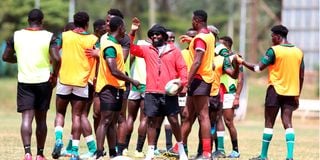Premium
Academic training is vital for sports coaches looking to shine bright

Kenya Sevens Rugby coach Kevin Wambua (center) with his players after a training session at Moi International Sports Centre, Kasarani on July 3, 2024.
What you need to know:
- Academic training helps coaches sharpen their critical thinking and problem-solving skills.
- Academic training enables coaches to concentrate on the holistic development of their athletes.
In today’s world, sports and education are deeply interconnected. It is increasingly important for support personnel working with athletes to pursue academic studies to bridge the gap between theory and practice.
This applies to coaches, managers, and administrators at all levels.
This article will delve more into the coaching aspect of sports performance and attempt to give compelling reasons why academic training is indispensable for sports coaches.
Academic training is absolutely vital for sports coaches as it establishes a solid foundation that extends beyond technical expertise. It provides them with the necessary knowledge and skills to effectively support athletes and significantly enhance their overall coaching effectiveness.
The sports world is always changing, with new trends and technologies emerging regularly. Academic training helps coaches sharpen their critical thinking and problem-solving skills, enabling them to stay adaptable and innovative. This allows coaches to embrace new techniques, integrate technology, and meet the ever-changing needs of their athletes.
Academic training enables coaches to concentrate on the holistic development of their athletes, addressing not just their physical skills, but also their mental and emotional well-being. This training empowers coaches to design personalized programmes tailored to each athlete’s specific needs, thereby assisting them in reaching their full potential.
A strong academic foundation provides coaches with access to the most recent research in sports science, instructional techniques, and coaching strategies. This allows them to utilize evidence-based practices, analyse performance more effectively, and make informed decisions that enhance training results and overall athlete performance.
Pursuing education often involves collaborating with other professionals, attending workshops, and engaging in ongoing education. These experiences broaden a coach’s knowledge, foster professional growth, and create valuable connections within the coaching community, leading to mentorship and collaboration opportunities.
Ultimately, coaches with strong academic background may be better equipped to help their athletes succeed. They can create a positive environment, reduce injury risks, and promote long-term athlete development. This leads to better team dynamics, improved performance, and higher levels of satisfaction for both athletes and coaches.
National Olympic Committee of Kenya, using this background has robust programmes on coaches education. Every year at least two to five coaches are given scholarships to pursue further education, in addition to their sports-specific technical training. This is enhanced further by collaborations with local universities. NOC-K is at the final stage to go into a Memorandum of Understanding with the University of Nairobi to provide coaches education. This will strive to bridge the practical experience with academic knowledge.
We are currently working on collaborations with other local universities to introduce Olympic research into the curriculum and other aspects of sports education. These efforts will bring together academics and technical personnel to improve sports offerings in the country. Kenya is already a relatively strong sporting nation with great coaching and athletic talent. With enhanced knowledge and professionalism, we have the potential to become unstoppable.
I hope to live to see our universities in conjunction with our federations going into research and development of our sports. This is an idea whose time is long gone but can be recovered.
Mutuku is Secretary General of NOC-K. [email protected]





